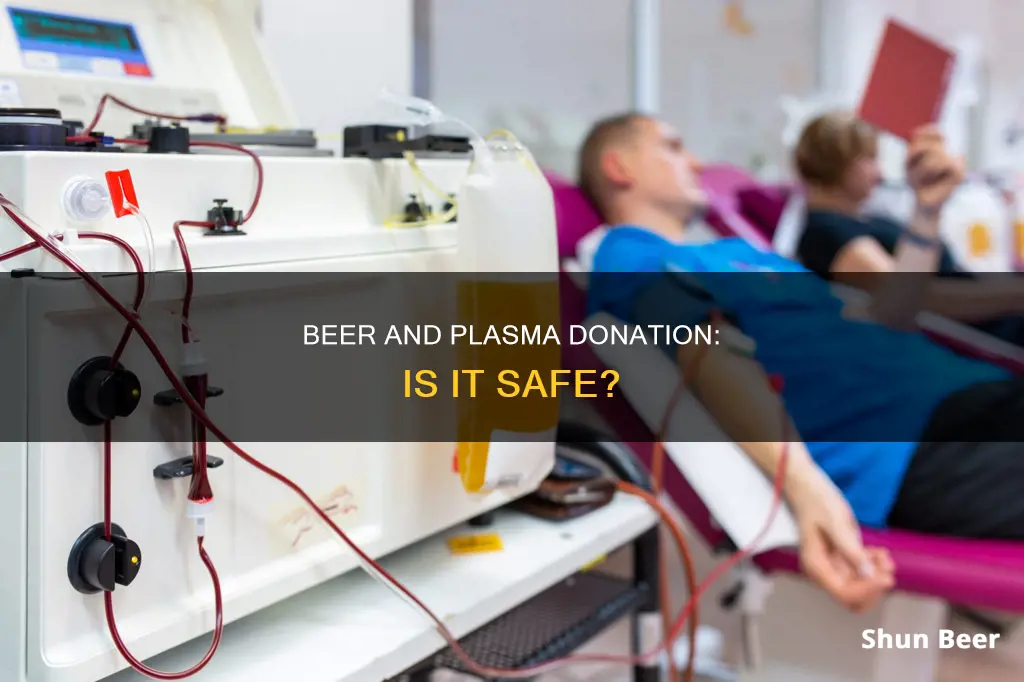
If you're planning on donating plasma, it's important to prepare your body in advance. This includes staying hydrated by drinking plenty of water or juice, getting a good night's sleep, and eating protein-rich and iron-rich meals. However, donors are advised to avoid drinking alcohol the night before and the day of their donation. So, if you're thinking about drinking a beer before donating plasma, the answer is clear: it's best to avoid alcohol altogether and opt for other beverages to ensure a safe and successful donation experience.
Can I drink a beer before plasma donation?
| Characteristics | Values |
|---|---|
| Alcohol consumption | Avoid alcohol the night before and the day of the donation |
| Dehydration | Alcohol promotes dehydration, and blood donation increases the risk of dehydration |
| Recovery | Alcohol should be avoided until the donor has fully recovered from the donation |
| Time to wait | Most donors can handle alcohol 24 hours after their donation |
What You'll Learn
- Alcohol dehydrates the body, which is why it's recommended to avoid it before donating plasma
- Drinking water before plasma donation helps prevent fatigue and dizziness
- Plasma is 90% water, so staying hydrated ensures the procedure is well tolerated
- Drinking alcohol after plasma donation can be dangerous because there is less blood to dilute the alcohol in your system
- Staying hydrated after plasma donation helps the body replenish the donated blood

Alcohol dehydrates the body, which is why it's recommended to avoid it before donating plasma
Plasma donation is a safe and simple procedure, but there are a few things donors should keep in mind to ensure a smooth and comfortable experience. One important consideration is staying properly hydrated. Plasma is primarily composed of water, so it is crucial that donors are well-hydrated before and after the procedure.
Alcohol consumption should be avoided the day before and the day of the donation. Alcohol is a diuretic, which means it increases urine production and promotes dehydration. Even a small amount of alcohol can have this effect, as it interferes with the body's ability to regulate water levels. Alcohol inhibits the release of the anti-diuretic hormone vasopressin, leading to increased urination and dehydration.
The effects of alcohol-induced dehydration can be particularly noticeable after donating plasma. This is because donating plasma can also lead to dehydration, and the combination of the two can be more likely to cause discomfort. It is important to remember that even one alcoholic drink can contribute to dehydration, as the diuretic effects of alcohol can outweigh the hydrating effects of the non-alcoholic fluids in beer, wine, or liquor.
To ensure a positive donation experience and support your body's hydration needs, it is recommended to avoid alcohol and focus on staying adequately hydrated before and after donating plasma.
Antibiotics and Beer: A Safe Mix?
You may want to see also

Drinking water before plasma donation helps prevent fatigue and dizziness
Drinking beer before donating plasma is not recommended. Alcohol should be avoided the night before and on the day of the donation. Alcohol can cause dehydration, and donating plasma also affects hydration levels.
Drinking water before plasma donation is highly recommended, however, as it helps prevent fatigue and dizziness. Plasma is 90% water, so staying hydrated ensures the procedure will be well tolerated and the recovery more rapid. Drinking water before a plasma donation appointment also ensures the veins are adequately dilated, making inserting the needle easier.
It is recommended to drink at least 8-10 glasses of water the day before donating plasma, and 3 good-sized glasses of water in the 3 hours before the appointment. Drinking water or juice the day before and the day of the donation is also advised. Donors should aim for a total of 6 to 8 cups of fluid.
Water is absorbed faster and more efficiently by the body than sugary or caffeinated drinks. It is also important to limit caffeinated beverages on the day of the donation, as caffeine can elevate the pulse, potentially preventing someone from being able to donate.
Drink Warm Beer? The Pros and Cons Explained
You may want to see also

Plasma is 90% water, so staying hydrated ensures the procedure is well tolerated
Plasma donation is a simple process, but there are a few things to keep in mind to ensure a positive experience. Firstly, it is crucial to understand that plasma is 90% water. Therefore, staying hydrated is essential to ensure the procedure is well tolerated and to promote a rapid recovery.
Drinking plenty of water before donating plasma is highly recommended. Aim for 12 to 24 ounces of water or a sports drink 30 to 60 minutes before the donation. This will ensure your veins are adequately dilated, making it easier for the medical professional to insert the needle. Proper hydration also helps maintain your energy levels during the procedure.
In addition to water, you can also drink juice to stay hydrated. However, it is important to avoid alcoholic and caffeinated beverages, as they promote dehydration. Alcohol and caffeine can negatively impact your donation experience and should be avoided the day before and the day of your donation.
It is also important to eat a healthy, low-fat meal two to three hours before donating plasma. A protein-rich and iron-rich meal will keep your blood sugar stable and provide the necessary nutrients for a smooth donation process. Foods such as meat, chicken, eggs, dairy, broccoli, and iron-enriched cereals are excellent options.
By following these guidelines and staying hydrated, you can ensure that your plasma donation experience is comfortable and contributes to a worthy cause. Remember, your donation has the power to save lives, so take care of yourself before and after the procedure.
Beer Drinking: A Cause for Erectile Dysfunction?
You may want to see also

Drinking alcohol after plasma donation can be dangerous because there is less blood to dilute the alcohol in your system
Drinking alcohol before donating plasma is not recommended. Alcohol has dehydrating effects, and plasma is 90% water, so staying hydrated is crucial before and after donating. It is recommended to drink water or juice the day before and the day of the donation.
It is also important to note that drinking alcohol after donating plasma can be dangerous. This is because there is less blood to dilute the alcohol in your system, increasing the risk of dehydration, which can lead to dizziness, fainting, and nausea. In addition, alcohol can affect blood coagulation, increasing the risk of bleeding, and can also lower blood pressure. These effects can be dangerous, especially when combined with the physical changes caused by donating plasma, such as reduced red blood cell count and lower blood volume.
To ensure a safe and smooth recovery after donating plasma, it is generally recommended to abstain from alcohol for at least 24 hours. During this time, it is important to focus on rehydration and replenishing lost fluids by drinking plenty of water, fruit juice, or sports drinks. Eating iron-rich foods, such as red meat, spinach, and beans, is also crucial as it aids in regenerating red blood cells.
In summary, drinking alcohol before and after donating plasma can have negative consequences. It is important to prioritize hydration and give your body time to recover by abstaining from alcohol and following the recommended guidelines for a safe and positive donation experience.
Chemo and Beer: How It Affects Platelet Count
You may want to see also

Staying hydrated after plasma donation helps the body replenish the donated blood
Drinking alcohol before donating plasma is not recommended. Alcohol is known to promote dehydration, and proper hydration is crucial for a smooth plasma donation experience. Plasma is primarily made up of water, so staying hydrated helps maintain blood volume and fluid balance in the body. This, in turn, ensures that the body functions optimally.
Now, let's discuss why staying hydrated after plasma donation is essential for replenishing the donated blood.
Plasma donation causes fluid loss, and it is crucial to replenish those fluids by drinking plenty of water. Water is one of the most important components of blood, and staying hydrated helps the body restore its balance. Drinking water or electrolyte-rich beverages can help replace lost fluids and maintain hydration levels. This is especially important because dehydration can lead to a greater decrease in blood volume, cramps, and general weakness.
Additionally, staying hydrated supports optimal blood flow. It helps the blood move smoothly through the veins, which is essential during plasma donation. Proper blood flow makes the donation process more efficient and comfortable for the donor.
Drinking water after donating plasma is also crucial for replenishing the water content of plasma. Plasma is more than 90% water, so staying hydrated helps the body recreate the proteins and other nutrients it contains.
By staying hydrated, donors can promote a faster recovery. The body will immediately begin to replace the fluid portion lost after donation, and staying hydrated ensures that this process is efficient.
In conclusion, staying hydrated after plasma donation is vital for replenishing the donated blood. It helps the body restore fluid balance, supports optimal blood flow, and promotes faster recovery. So, be sure to drink plenty of water or electrolyte-rich beverages after your plasma donation to support your body's replenishment process.
Beer and Kidney Cysts: What's Safe to Drink?
You may want to see also
Frequently asked questions
No, it is recommended that you do not drink alcohol before donating plasma. You should not drink alcohol 24 hours before donating plasma.
Alcohol can lead to dehydration, which is dangerous as plasma is 90% water. Dehydration can also lead to dizziness, fainting, or lightheadedness.
It is recommended that you drink water or juice the day before and the day of your donation.







